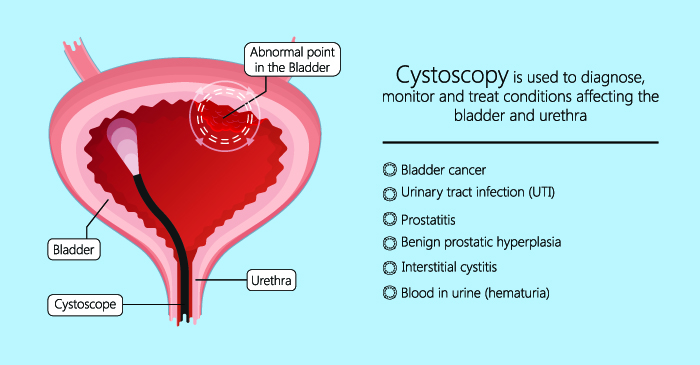Cystoscopy Treatment in Kondapur, Hyderabad
Cystoscopy treatment refers to the procedure that involves the endoscopy of the urinary bladder through the urethra. The urethra is a tube-like structure in the body that performs the function of carrying urine from the bladder to the outside of the body. Cystoscopy is performed with the help of an instrument called a cystoscope.
The cystoscope consists of lenses like a telescope or microscope that allow the physician to focus on the inner surfaces of the urinary tract. During the procedure of cystoscopy, a doctor inserts the cystoscope through your urethra and into your bladder to examine the inside of your bladder. Cystoscopy helps to test the health of your urethra and bladder. Cystoscopy treatment is also known as a cystourethroscopy or a bladder scope.

How is the Procedure of Cystoscopy Performed?
Before cystoscopy, your doctor may prescribe certain antibiotics before and after the procedure in case you have a UTI or a weak immune system. You will also be asked to provide a urine sample before the test.
The procedure of cystoscopy can be performed in a hospital or doctor’s office. You may be given any of the following forms of anaesthesia as thought best by the doctor for you: general anaesthesia, local anaesthesia, or regional anaesthesia.
Before the procedure of cystoscopy starts, you will be asked to use the restroom to empty your bladder. Thereafter, you might be given some antibiotics to prevent bladder infection. After treating you with anaesthesia, the cystoscope is inserted into the urethra. The doctor uses a lens that helps clear visual examination as the scope enters your bladder. A sterile solution may also be used to flood your bladder to makes it easier for your doctor to process the examination. If you’re given local anaesthesia, your cystoscopy may take less than five minutes. With sedated or general anaesthesia, the entire procedure may take about 15 to 30 minutes.
What are the Benefits of Cystoscopy Treatment?
Cystoscopy is a procedure that helps the doctor in examining and diagnosing the urinary tract, particularly the bladder, the urethra, and the openings to the ureters. Cystoscopy treatment can help find problems related to the urinary tract. This may include early signs of bleeding, blockage, cancer, infection, and narrowing.
What are the Side Effects of Cystoscopy Treatment?
Side effects of cystoscopy may include:
- Possibility of infection in the urinary tract
- Blood with urine
- Abdominal pain
- Pain and burning sensation while urinating
- Inability to urinate
- Blood clots in urine
- Nausea
- High fever
Request an appointment at Apollo Spectra Hospitals, Kondapur
Call 1860-500-2244 to book an appointment
Who are the Right Candidates for Cystoscopy Treatment?
Your doctor at Apollo Kondapur may recommend a cystoscopy if you experience:
- Bladder stones
- Bladder inflammation
- Blood in urine
- Painful urination
- Frequent urinary tract infections
- Bladder incontinence
- To diagnose an enlarged prostate
- Overactive bladder
- Bladder cancer
Cystoscopy is a safe procedure. If you have any questions, don’t hesitate to speak to your doctor.
People often worry about the process of cystoscopy being painful, but it does not usually hurt. During the procedure of cystoscopy, you may feel a little uncomfortable when the cystoscope is inserted into the urethra and bladder. You may feel a strong need to pee when your bladder gets full and a pinch if the doctor takes a biopsy. After cystoscopy, your urethra may feel sore and it might burn when you pee for a day or two.
Cystoscopy may be regarded as an embarrassing and uncomfortable procedure for the patient as it involves exposure and handling of the genitalia. But, don’t worry and speak to your doctor for any information to help you feel comfortable.
No rest is required after the cystoscopy process. You will be able to drive yourself home after the process without any risks or complications involved.
It is recommended that you drink at least 8 glasses of liquids every day for the first few days after cystoscopy. This helps reduce the amount of bleeding you may have after cystoscopy. It also helps prevent any further infection.
It generally takes around 1 or 2 weeks for you to get your result for cystoscopy at a follow-up appointment.
Symptoms
Our Top Specialities
NOTICE BOARD
CONTACT US
CONTACT US
 Book Appointment
Book Appointment


.svg)
.svg)
.svg)
.svg)








